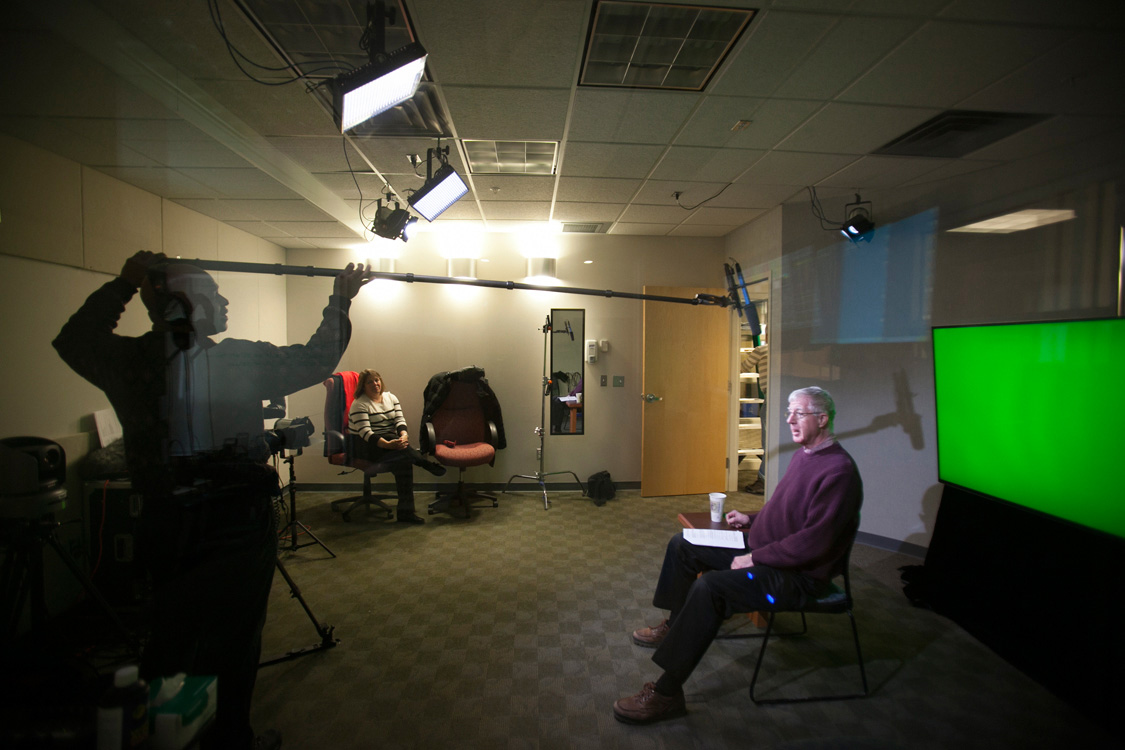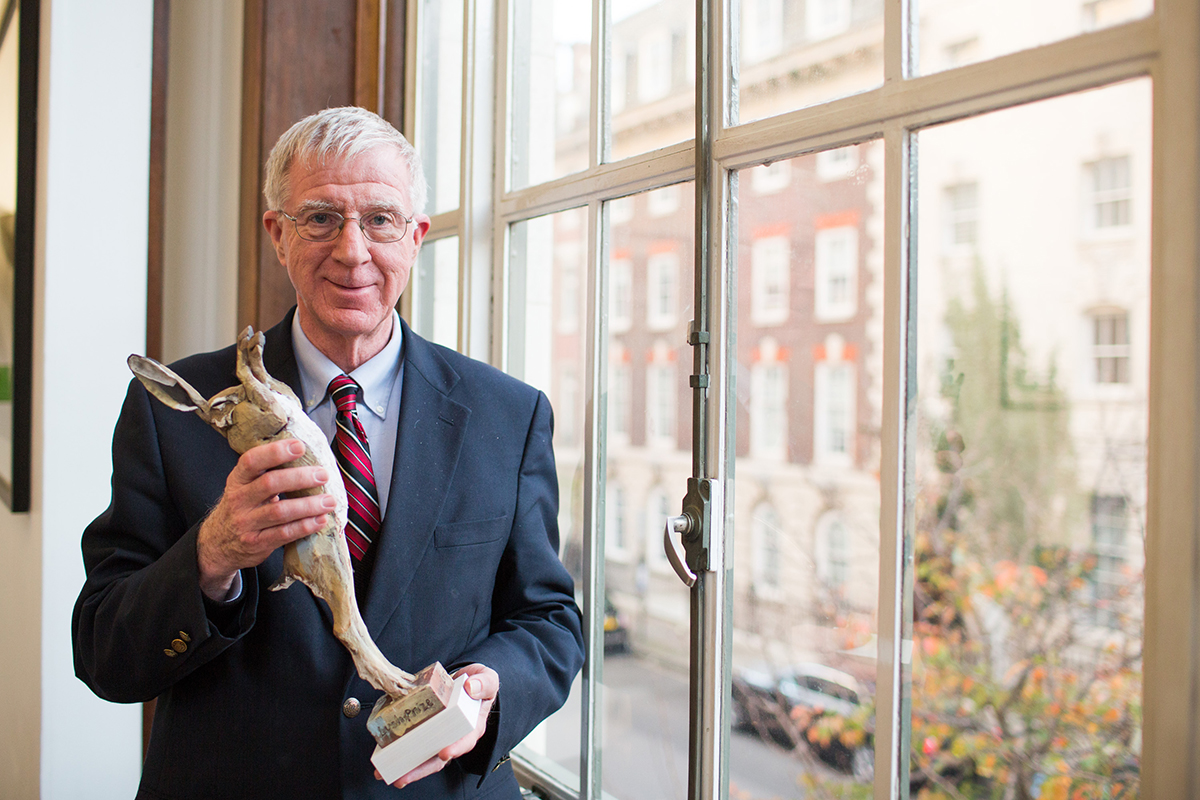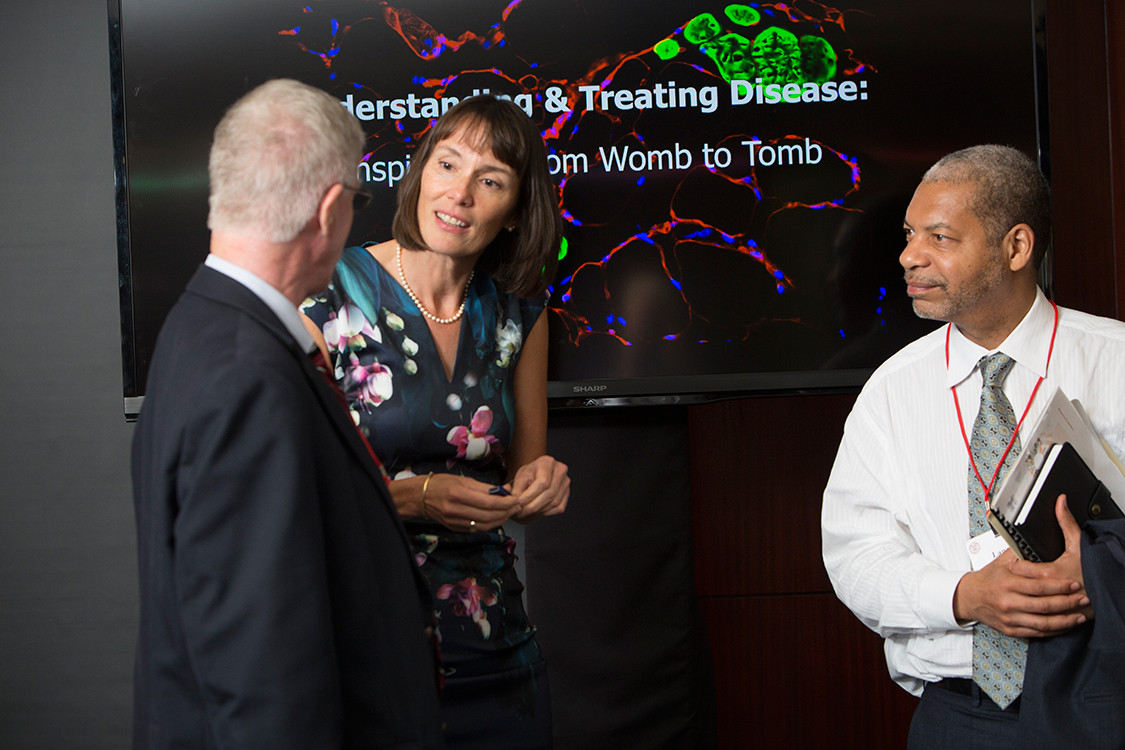
Symposium honors Mike Shuler, bioengineering pioneer
By Syl Kacapyr
Scientists from around the world gathered at Cornell on June 22, 2018, to honor the career of Professor Michael Shuler, whose work in modeling biological systems continues to revolutionize the field of bioengineering and change the way pharmaceutical drugs are developed and tested.
A day-long symposium hosted in Klarman Hall featured talks from over a dozen academics and industry engineers who discussed how Shuler, who recently received emeritus status as the Samuel B. Eckert Professor of Engineering, changed bioengineering while also serving as a soft-spoken mentor whose guidance was relied upon by many.
“Mike thinks differently about research problems than almost anybody – than engineers do, than biologists do, than doctors do,” said Abe Stroock, the William C. Hooey Director and Gordon L. Dibble ’50 Professor of Chemical and Biomolecular Engineering. “If you didn’t know any better, you might think he was a little out of whack in how he was defining his problems and pursuing them.”
When Shuler was hired in 1974 as a professor of chemical engineering at Cornell, he began to apply principles of chemical engineering to understand how cells worked, and sought to build in vitro systems that could quantitatively simulate biological ones.
“In the earliest days when both biologists and engineers assumed that a living cell was an intractable mess, Mike set out to write down the equations that define its dynamics,” said Stroock, speaking to about 160 people attending the symposium. “He used computers that were less powerful than a hand-held calculator today to take a fully chemical-kinetics engineering approach to understanding metabolism and signaling and gene regulation. He was doing systems biology 20 years before that term existed.”
Shuler’s early work at Cornell led to the first chemically-accurate mathematical model of an organism. The model, published in 1984, could predict the changes in composition, size, and shape of a single E.coli cell, as well as the timing of its chromosome synthesis in response to changes in external glucose limitation.
Soon after, Shuler and other engineers began to see cells as bioreactors for drug production. As industry and academics were trying to converge on just a few cell types to be the work horses of biomanufacturing, Shuler began working with insect and plant cells, “off in left field…in a place where very few people were going to follow him,” as Stroock described it.
But Shuler proved those cell types could be used as powerful platforms for the production of pharmaceuticals like chemotherapeutics. In 1995, he published a study that showed bioreactors could be used to mass-produce taxol, a compound used in cancer-fighting drugs that, until Shuler proved otherwise, could only be sourced from the bark of the Pacific yew tree.
Shuler said he first entered the field of chemical engineering because of his interest in drug manufacturing to save lives, but over the course of his career he grew more intrigued with chemical engineering’s role in learning about how life works.

By 1989, Shuler sought to model human organ systems, and set out to design a device that could act as a surrogate for real organs. He envisioned the impact such a device could have on society, including for people like his youngest daughter, Kristin, who has Down syndrome.
“People with Down syndrome have an extra chromosome and many times physicians are reluctant to prescribe drugs because the extra chromosome may react different to the drug,” said Shuler. “So we’d like to be able to capture that in a model and that was one of my main motivations – doing something to help people like Kristin.”
Shuler spent the next 20 years engineering physical models to represent mathematical models of the human body – research that, at first, received little attention from the rest of the science community.
“Funding was a little more scarce,” said Shuler.
But during that time, he had persevered to develop a new set of approaches on tissue engineering, drug discovery and toxicology with his so-called body-on-a-chip, a microfluidic device that can replicate the functions of organs and tissue.
Beginning in 2004, Shuler began publishing studies that showed it was possible to co-culture different organ-derived cells on a small, in vitro chip that could then be used to observe the complex responses human organs would have to cancer medication. Until the invention of the body-on-a-chip, animal testing was the only reliable way to achieve the same observations.
Shuler’s work birthed a new field in bioengineering, and today, body-on-a-chip systems are an exciting area of science being explored by many scientists and engineers.

BUILDING A SCHOOL
At the same time he was pioneering an entirely new area of bioengineering, Shuler was also hard at work laying the foundation for what would one day become a new school at Cornell.
Since his first days at the university, Shuler was a strong advocate for integrating the life sciences into engineering. He helped formalize the university’s first bioengineering program in 1994 with an undergraduate bioengineering option and a Master of Engineering degree in bioengineering.
He served as director of what was then the School of Chemical Engineering from 1998 to 2002. And while elements of bioengineering had been a part of the school since the 1950s, Shuler is credited with growing its prominence, and led the effort to officially add the word “biomolecular” to the school title. The school stands today as the Robert Frederick Smith School of Chemical and Biomolecular Engineering.
During his time as school director, Shuler was also sowing the seeds for a new biomedical engineering department. He had served on an advisory board that founded the graduate field of biomedical engineering in 1997, spanning five colleges and 11 different departments. The board eventually pushed for a more centralized academic unit that could have a larger impact on the field, calling for a strategic plan to establish a department.
It wasn’t until 2004 that biomedical engineering became a full-fledged department, of which Shuler became the founding chair, a role he would serve in for a decade.
“It wasn’t just his vision, but it was also his perseverance and hard work,” said Marjolein van der Meulen, who succeeded Shuler as the James M. and Marsha McCormick Director of Biomedical Engineering.
Van der Meulen said Shuler formed the department with a core set of values “and all the hires under Mike bought into that set of values. And that created a very shared experience and a unity that’s really unique and strong.”

At the time the department was founded, Cornell was competing with about 100 other newly established biomedical programs from across the country, according to Lance Collins, the Joseph Silbert Dean of Engineering.
“So it was incredible that Mike was able to attract a stellar faculty,” said Collins, “and it was really the power of his personality that was so attractive to people who were under consideration.”
Shuler characterized the challenge of building a faculty from scratch more as a luxury, and said it gave him the opportunity to hire individuals with complimentary skills.
“You have to think about, when you’re hiring faculty, building a team that will do something intellectually interesting. The intellectual parts have to mesh together,” said Shuler, who added that teaching, research, service to the department and service to engineering are all important elements a faculty must possess.
Shuler created the momentum upon which van der Meulen could continue to grow the department, said Collins, and in 2015, the department became the Nancy E. and Peter C. Meinig School of Biomedical Engineering, adding an undergraduate degree to its curriculum.
“Just to put this into context,” said Collins, “the first named department in the college is the Sibley School that was named in 1885, so it had been well over 100 years since that had happened.”
In less than 15 years, biomedical engineering at Cornell had grown from a vision to a nationally-ranked school. U.S. News & World Report’s 2018 graduate school ranking places the Meinig School at number 14 in the country.
SHULER THE MENTOR
When Shuler was an undergraduate at the University of Notre Dame, he was confronted by a faculty member who told him he was underperforming.
“He really encouraged me in the sense that I could do much better,” said Shuler. “And I did do much better after that – one of the things that was great about somebody encouraging me to believe in myself. And that’s one of the things I’ve tried to do with the students I work with.”
The symposium’s keynote speaker, George Georgiou, M.S. ’83, Ph.D. ’87, shared a similar story. As a professor of chemical engineering and the Laura Jennings Turner Chair in Engineering at the University of Texas at Austin, Georgiou is an award-winning researcher lauded for his advances in protein therapeutics. But as Shuler’s Ph.D. student preparing to graduate from Cornell, he struggled with confidence and felt his grades weren’t as competitive as they could have been.
Shuler convinced Georgiou to apply for a faculty position at the University of Texas at Austin, and Georgiou credits getting the job to a recommendation letter from Shuler that touted his potential.
Georgiou shared a second recommendation from Shuler – a nomination letter for a National Science Foundation Presidential Young Investigator Award – that would boost Georgiou’s career once again.
“It said I ‘will do something important,’” said Georgiou, reading from the letter. “And that’s what set me to the right course for my career.”
Georgiou said he learned many lessons from Shuler, including “to believe in your students and to go through great lengths to support them. Mentoring is a great privilege and responsibility.”
Mariajose Castellanos, Ph.D. ’05, senior lecturer and undergraduate program director at the University of Maryland, Baltimore County, was another former student of Shuler’s who spoke highly of his ability to mentor.
“Mike has really inspired me to make a difference in people,” said Castellanos. “And so I think ‘what can I do today to change someone’s life?’”
She said Shuler taught her to develop students not just as engineers, but as human beings, and that many of the traditions she has created for her students are modeled after the ones she experienced at Cornell.
Many of Shuler’s colleagues, too, benefited from his mentorship and advice. When the College of Engineering began searching for a new dean in 2008, Shuler’s name was among those being considered, according to Collins, who was director of the Sibley School of Mechanical and Aerospace Engineering at the time. But Shuler contacted Collins and encouraged him to consider the job.
“It’s not something I planned,” said Collins, “but in that sort of quiet way we had an important conversation which, in some sense, built some of the confidence I would need in order to step into that role. And it’s really incredible looking back on that, how important that was.”
WORK TO BE DONE, FISH TO BE CAUGHT
Although he has received emeritus status, Shuler plans to maintain a small research group for at least the next four years to continue two funded research projects. He will also remain active in commercializing his body-on-a-chip technology as president and CEO of the startup company Hesperos, Inc.
Other than research, Shuler plans to dedicate more time to his favorite pastime, fishing, and hopes to write a science fiction novel. But above all, he said he looks forward most to spending more time with family.
“You need to be able to balance your family and work, especially if you’re going to do this for 30, 40, 50 years,” said Shuler. “I occasionally see people that are so focused on trying to be successful they lack this other aspect of life.”
While those that know him best said they don’t expect to see Shuler as much on campus, they do look forward to having him remain in one role he has always cherished – as a beloved professional advice giver.

